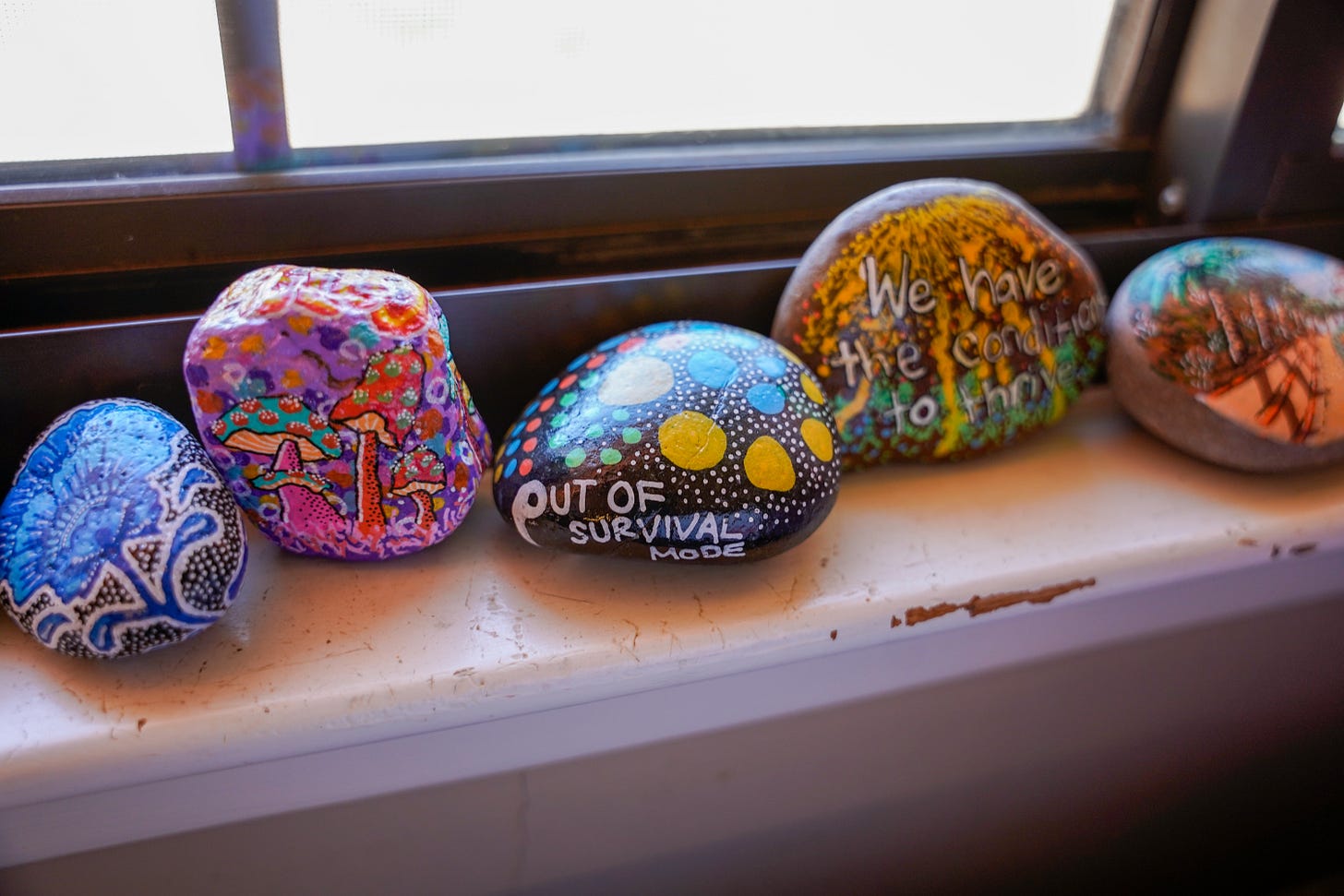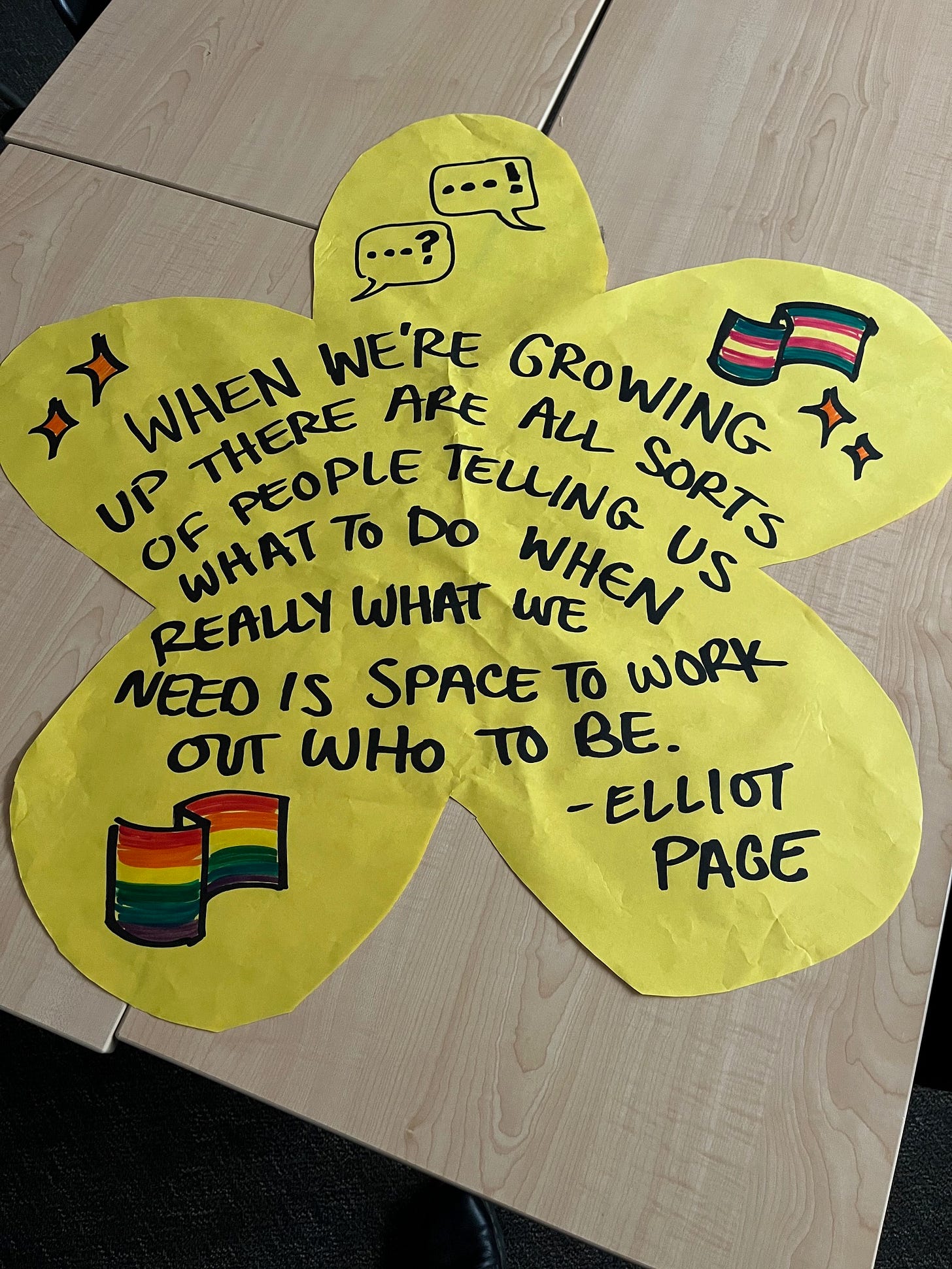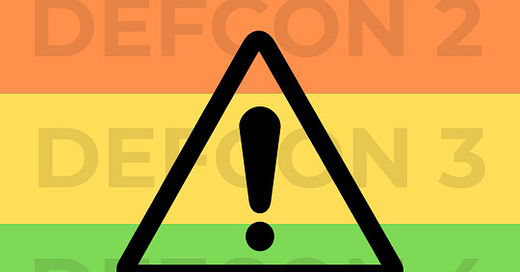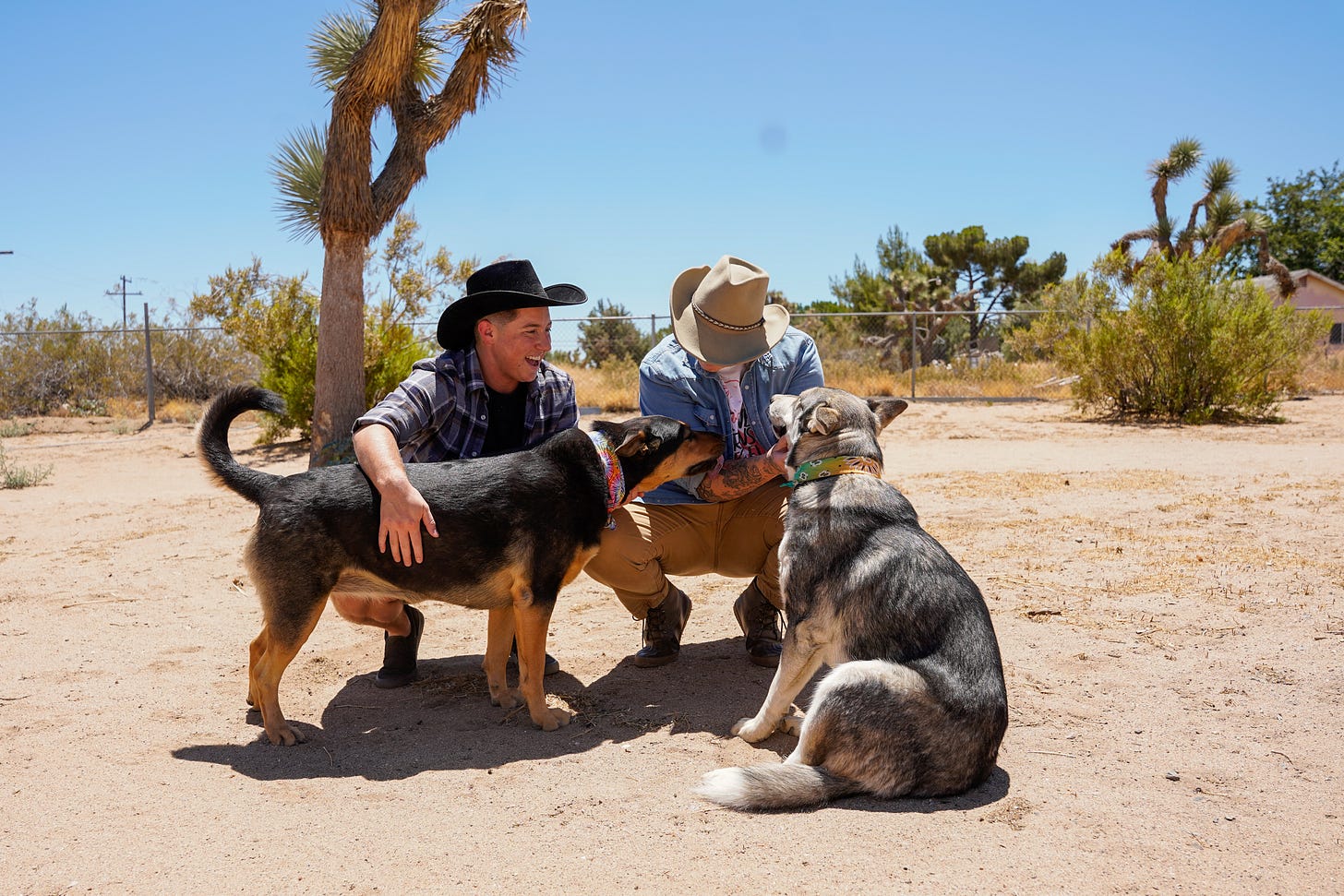When do we go to LGBTQ DEFCON 1?
An article for the queer Americans who are all wondering if they’re overreacting (and the allies who have no idea how to help us)
Most Americans who made their way through public education have at one point found themselves, usually during their senior year of high school, in an economics course. It’s a class designed to prepare young people for the monetary realities of the life into which they’re about to be ceremoniously shoved, and it’s often the first time many of us were asked to plan for our financial futures.
I was an artistic kid who used my SAT prep book as a canvas for margin poetry, and “budgeting” has always been my trigger word. So no, I did not radiate joy when my econ teacher told us to prepare a financial life map.
I wanted to be a teacher, so I had to find job postings online with listed salaries.
Wait, no. That can’t be right. What the hell?
I raised my hand.
“No, that’s correct,” my teacher sighed. “Good thing about the health insurance though. And you can’t beat the retirement.”
I kept her words locked away for fifteen years. Through every exhausting twelve hour day, through campus lockdowns and budget cuts, through lean months and shitty apartments, through COVID and harassment and classroom bomb threats.
Can’t beat the retirement.
I didn’t make it, though. About one in ten trans people have been exactly where I am now: forced out of a job I thought would be part of my life forever. Not fired, just harassed and isolated past the point of what my body was capable of weathering. I resigned and moved out to the desert with my trans husband, Xilo, to heal. Within a year, it was clear we were going to have to move again. But to where? It was too expensive to go abroad, and settling somewhere in the US felt foolish to the point of lunacy. Every day, our government is passing anti-trans policies like we have the price of eggs and the soul of America held hostage in our spare room.
When Xilo and I decided that a home-on-the-go was our best bet, I crossed my fingers and logged in to my CalSTRS (California State Teachers' Retirement System) account. There was enough there to make a down payment on a good trailer, but not for much else. Our options were limited, so I started the process to withdraw it.
To anyone in a different place, this might seem insane. I know. I can feel the collective butthole clenching of a thousand financial planners from here. But queer people, and especially trans people, are operating in a different ZIP code right now.
I have to consider:
I started my job under a different name and gender marker. What are the chances another move by the federal government keeps me from claiming my property? Especially once my current documents (ID and passport) expire?
Trans people are already living outside of a “presidential decree” that there are only two narrowly-defined genders. What happens if there’s a move to revoke our citizenship?
What if the way I currently earn for my family is no longer possible as employment protections narrow and private companies distance themselves from us?
What if I don’t make it to 65 at all?
While there’s no credible research outlining our comparative life expectancy, a lot of us struggle to envision our long-term survival. Looking to the distant horizon is a gift. A lot of us are just making sure there’s ground under our feet right now.
LGBTQ DEFCON: Explained
The most destabilizing part of crisis preparedness is fact checking.
When is following a rabbit hole of “what ifs” an exercise in pattern recognition and smart planning, and when is it just spiraling?
Those of us who came of age during George Bush Jr’s “war on terror” are at least passingly familiar with the Homeland Security advisory system that the administration used to communicate our nation’s “terror alert level.” The levels, which ranged from “low” in green at the bottom to “severe” at the top in red, were used without really obvious criteria (and often with sideways political intentions), and we vacillated between yellow and orange ad nauseam from the premier of American Idol to the announcement of Beyonce’s first pregnancy.
The US’s “DEFCON” system, however, has more defined edges, and we’ve been using it since 1959 to communicate and describe our military’s levels of readiness for an impending conflict. Our current DEFCON level is kept from the general public, and you’ve probably used it or heard it used in a more casual, less life-or-death kind of way out in civilian life. If you’ve never seen it spelled out before, this is what they are:
DEFCON 5 (low/normal readiness)
DEFCON 4 (above normal: increased intelligence, strengthened security)
DEFCON 3 (air force ready to mobilize within 15 minutes)
DEFCON 2 (armed forces ready to engage in less than 6 hours)
DEFCON 1 (maximum readiness, immediate response)
We went to DEFCON 3 during the aftermath of 9/11, and DEFCON 2 on the edge of the Cuban Missile Crisis. We’ve never been to DEFCON 1.
It’s worth having an internal “DEFCON” system for the perceived threats in our lives, or we risk spending most of our precious and few hours on earth peeking out from our bunkers, watching the sun rise and set without us. Trauma (and neurodivergence, which we have in spades) makes us black and white, all-or-nothing thinkers, because a rigid worldview can keep us safe – but it can also disempower and gaslight us. Queer people have a high chance of carrying some kind of trauma around (for reasons we’ll get around to later) so we tend to either doubt and underreact to our experiences or panic and overreact to them.
So if you are looking for the “exit” signs in the US right now – are you overreacting?
Probably not.
I know this based on my own sense of my internal DEFCON levels, but also in how they match up with the ones I’m seeing out in the wild. Ever since Xilo and I have been more forthcoming with our plans to scoot, we’ve had a chance to gauge the reactions of our friends, neighbors, and the dozens of other people we interact with out in the non-digital world.
At the barber, the bank, the grocery store – everyone who hears what we’re up to has nodded and sighed. There’s no surprise, no attempt to talk us out of it.
“I get it,” we’re hearing.
“I would leave too.”
Sometimes, we need to hear that it’s not just us. That this dread is not just the result of a chorus of opportunistic online alarmists. That the sharp pang of fear we feel on every inhale is real.
It’s not just you. It’s real.
But don’t let that “all-or-nothing” voice disempower you yet.

What should you do now?
When I wrote in more detail last week about the events that led to this decision for my own family, the number one message I received after was
“What should I do?”
Each message came with a unique and specific set of circumstances, and no two were alike:
“I’m the parent of a trans kiddo in Washington state, but their dad lives in Texas…”
“I’m 17, nonbinary, and supposed to go to college in Florida next year…”
“My wife and I just got married and I’m worried I won’t be able to adopt her son…”
“I’m only halfway through my transition and my name is changed on my license, but I didn’t get my passport in on time…”
Universal guidelines in moments like these are not just inadvisable, they’re impossible. This country is huge, and the decisions that come next for us are highly personal. But if what you need is a starting point, or even just a place to begin building your own DEFCON system, here’s what I’ve got for you:
Unstick yourself from decision paralysis with something small
Another insight from Trauma Central: nothing changes when you’re stasis. If you’ve ever been caught on the edge of a transition or in the depths of an internal shutdown, you know that what you usually need is any kind of momentum at all to break yourself out of it. Getting a drink of water, dragging yourself into the shower, texting a friend – whatever. Feeling stuck is the worst, and what many of us are experiencing right now is a large-scale freeze. You aren’t fleeing to the border tomorrow, but what can you do? Can you pack an emergency bag, even if you may never use it? Can you get your meds and important documents into one place? Can you ask a neighbor if they’d be willing to feed your cat just in case? You might never need these things, but doing any one of them can validate the need for action living inside of your body. Doing something is a great start.
Make a safety/contingency plan
If you had to leave your home today, where are three safe places you could sleep tomorrow? Who do you know, if anyone, in another state? Another country? What arrangements would you have to make to stay safe if you had to leave, and which would you be willing to skip? Do you have gas in your car? A bus pass? What valuables do you have that you might be able to sell in a pinch? It’s uncomfortable to think through these questions now, but they’ll be a lot harder in an emergency. They might not all have answers, but some of them do.
If you’re the parent or caretaker of a young trans person, consider that they’re likely hearing and feeling the rise of animosity against them, no matter where you live. Depending on their age and your own personal judgement, consider developing this plan together, or giving them the basics of one that you develop on your own. Let them know that they’re being thought of, and that the adult in their life is taking this seriously. Whatever you do, try not to project your fear onto them. Keep that processing within adult circles, and make sure they know that they can come to you with challenging feelings.
Sit in the discomfort of the unknown
If you’re looking for an authority here, there isn’t one. If someone says that they absolutely know what comes next for us, no they don’t. There is no clear answer, there are no obvious right or wrong choices, there is just the next choice. Take your time, learn within your capacity, but if you’re waiting to make your next move until a defined leader with a foolproof plan makes an unmistakable announcement, you’ll be waiting a long time. Possibly too long. You are the authority within your own life, and you’re going to have to learn to trust your own intuition. Listen to guidance, sure, but make your own choices. There’s no practice exam, and the timer has already started.
Whatever you do, you will not be able to do it perfectly
If there’s any cardinal sin we can’t get away from as a community, it’s our strict adherence to purity tests. We bicker about gold star lesbians and neopronouns and whether honey is vegan, holding each other to impossible standards that only match in rigidity to the ones we use for ourselves. It’s exhausting, and it was unsustainable before – but now? If there was ever a time to release yourself from the cycle of shame, it’s at this exact moment right here.
I’ll give you an example. Xilo and I pulled up to a used car lot yesterday to sell our little farm truck and trade up to something that can more reliably pull a trailer large enough to live in. We’d seen one online that was within our budget, and we live in Truck Enthusiast HQ, USA, so we knew we had to jump on it fast. But when the 23-year-old employee pulled it around for our test drive?
“This thing is built for hauling,” he said.
“Are you sure it wasn’t built for intimidating freshmen?”
It was gigantic. Comically large. I am 6 feet tall if you don’t ask me twice, and I could rest my chin on the bed. We bought it when I realized that my only hesitation was an aesthetic one. It was the right truck for our needs. We are making decisions on a timeline, and we do not have the luxury of perfection. A cute electric truck that wouldn’t challenge my earth-aligned values? Twice our budget, at minimum. It would rely on an infrastructure we might not be able to access. We had to move on.
As you’re making your own decisions from here, be nice to yourself. And remember that we have a strong pull to project our feelings about ourselves onto others. Be kind– we’re all doing our best under less than ideal circumstances.
You are modeling right now, so act like it.
If there’s a comment I get the most about the “content” I’ve been making online for the last four or so years, it’s that I am calm, reasonable, researched, and rhetorically generous. I’ll add to that – I am calm, reasonable, researched, and rhetorically generous when I am well rested, fed, and ready to be perceived by other people. I’m not a totally different person otherwise, but I try not to write or film myself when I am in the deepest throes of anger and frustration. I’m not out here making a video when what I really need is a bath, a string cheese, and a dark room. This isn’t because feeling isn’t important, but because my most intense reality is not my truest reality. I take a beat before I put anything into the world.
And that’s because our kids are watching. What I do – what we do – tells them what they should do. This is why I don’t highlight hateful comments anymore, even to address them. They have too much air already. And it’s also why I’m careful not to make impulsive or reactionary decisions, even when I’m scared. Even without a public platform, your actions and decisions have an impact on the youngest of us. We have a responsibility to be thoughtful about them.
Choose your bold red line
Every DEFCON system has its DEFCON 1– the red line between preparation and action. That line will be different for everyone. Xilo and I were propelled not just by the events and tragedies of the world, but by personal ones as well. If we had other options, we might have made a different choice. Defining and recognizing your DEFCON 1 will help as you are encouraged to move it. Goalposts tend to shift when you look away. Frogs go from “pleasantly warm” to “soup” when you blink for too long.
So what’s yours? When your access to healthcare is clearly stripped? When trans Americans lose the right to citizenship? When the supreme court repeals marriage equality? When queer parents lose adoptive rights to their children?
Maybe we’ve already crossed what your last red line would have been. What will the next one be?
For a lot of people, leaving (even under extreme and desperate circumstances) isn’t an option. There are smaller action items – building an old fashioned “phone tree” in preparation for communication interruptions, acts of civil disobedience or malicious compliance, even leaning into personal expressions of art – that can help empower you when you feel your most disempowered.
And none of this is either/or. It’s both/and. If you’re able to, taking steps to keep yourself or your family safe isn’t selfish, and you aren’t abandoning anyone. If you decide to leave, you’re getting yourself out of the way early so you can use the capacity you are hoarding to survive right now to help others later. If nine people are drowning and you see a rope to pull yourself out, grab it and get the fuck out. Once you’re out, go find another goddam rope.

How can I help?
Oh hey allies what’s up?
I know this is a frustrating time for you. Assuming you don’t fall into an immediately threatened demographic, it’s got to be disorienting to watch the rest of us flitting about preparing our doomsday plans while you’re being sent another “Call Your Representatives” infographic. You want real action, and you want someone with any kind of insight to give you a clearer picture of what could literally save the lives of the queer people who need you.
The problem is, no one wants the answer to be money.
I promise we can google “top countries for LGBTQ equality” ourselves. What we can’t do is fling ourselves there. And we are hustling to try.
You see, queer people are as capable, smart, and experienced as anyone else, but we are VASTLY underemployed and under-resourced.
The numbers for the LGBTQ population as a whole are hard to nail down, but thanks to the 2022 US Trans Survey, we have a solid place to start for trans people. So allow me to offer some insights here:
For about 29% of the population within the US, high school is their highest level of education. For trans people, that number is 35%.
9.5% of Americans didn’t finish high school. For trans people? 13%.
22% of Americans have a bachelor's degree. For trans people? 18%
Though 26% of trans Americans have finished “some college” compared to the national rate of 16%, the number of us with a Masters or PhD? Only 7%. The rest of the country sits at 13%
And why is that? In a survey by the Association of American Universities (AAU), 60% of transgender college students reported that they feared for their physical safety due to their gender identity or their perceived sexual orientation, and 65% of transgender students reported experiencing harassment since they first enrolled.
Outside of education, about a third of trans people live below the poverty line. For the rest of the country, that number is 11%. Our unemployment rate is 18% against a national average closer to 4%. And as I mentioned at the top of this article, more than one in ten of us have been fired, forced to resign, or been laid off because of our gender identity or expression.
And just about a third of us have been homeless. The Williams Institute found that 31% of LGBTQ students surveyed in 2021 experienced “housing disruption” during COVID, compared to about 17% of their non-LGBTQ peers.
According to the 2020 LGBT Financial Experience report by Prudential (which, despite its name, doesn’t include data for trans people), gay and lesbian respondents (and bisexual women) earned less than their straight counterparts.
The average wages reported were:
Lesbian female respondents: $45,606
Gay male respondents: $56,936
Bisexual female respondents: $35,980
Bisexual male respondents: $85,084
Heterosexual female respondents: $51,461
Heterosexual male respondents: $83,469
In that same study, LGBT respondents also were less likely to have savings accounts, employer sponsored retirement accounts, or individual retirement accounts.
Counter to the rhetoric we’re seeing about DEI right now, we don’t seem to be benefiting much at all. This isn’t about merit or skill. I was a celebrated and infinitely employable teacher until I wasn’t. When I left, I spent six months clocking in for a nonprofit that worked with a high transgender staff population, and it always felt much more like a hostage situation than a workplace. The work was important, sure, and they knew that the people they had working for them didn’t have other options.
So allies, get angry, yes. But there’s a place after anger. If you can’t find a reliable way to get to the “action” part of your emotional cycle, you run the risk of it metastasizing into resentment, bitterness, depression, and even apathy.
As it gets more hostile for us here, the people left will be those in our community with the least. Meaning options, money, social power – all of it.
Often, people with money often don’t want to part with it if they don’t have control over what happens to it next. That’s – ideally – the river we’re supposed to bridge with nonprofits and social safety net programs. But we’re watching those programs being gutted before our eyes. Many nonprofits also receive federal grants to keep them alive – they’re already being pressured to distance themselves from us with a knife to their throats.
This means in addition to losing resources as we’re trying to get our shit together, all of the research and data I cited before? It might be the last time we see it.
Not only will our help dry up, we won’t even be able to prove that we need it.
So find us. There is a trans person in your life who doesn’t know who – or how – to ask for help. Social media is filled with organizations like the Okra Project and Advocates for Trans Equality. Subscribe to trans writers, authors, creators, athletes, and activists wherever you can – as soon as you find one, it won’t be hard to discover more.
I think a lot about my mother, who was homeless and living on Skid Row in Los Angeles while I was finishing high school less than a hundred miles away. How many people walked by her, sure that she would waste anything they gave? Sure that someone else would step up to help?
There’s no way to know. But it wasn’t zero. She died of pneumonia before I graduated, unable to afford a trip to the emergency room. She never used the retirement she once saved for.
This time, I’m not going to wait until it’s too late.
Xilo and I have put together a GoFundMe if you’d like to donate to the next step in our story. You can also pre-order my book, buy something we’ve made, or become a paid subscriber here on Substack.







As a parent of a 15-yr old trans person in CA, this has been on my mind constantly for the past month. I’ve also reached out to various LGBTQ2IA+ organizations (Brave Trails for example) that our family is part of to put together some resources and informational calls for the trans youth/parent community to help them through their own decision trees. This is such a useful post, which I will share widely! Thank you and perhaps you would consider a speaking role on some of those calls?
Thank you ❤️ this was comforting, in a strange way I guess because like WTF but also thank you for the reminder that I’m not overreacting and that making an imperfect plan is better than not having a plan at all